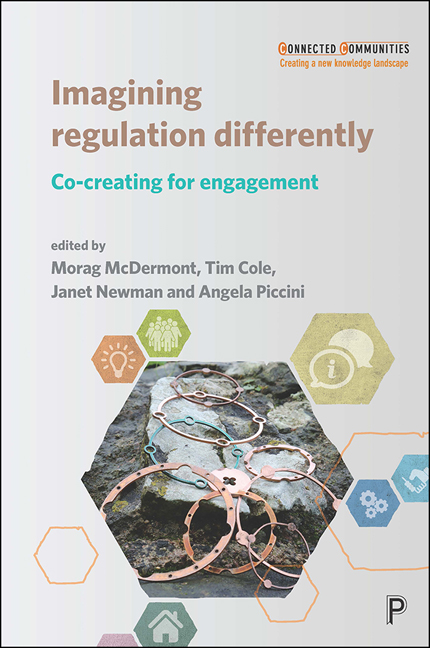Book contents
- Frontmatter
- Dedication
- Contents
- List of Figures, Tables and Boxes
- List of Abbreviations and Acronyms
- Notes on Contributors
- Acknowledgements
- Series Editors’ Foreword
- 1 Introduction: From the Regulation of Engagement to Regulating for Engagement
- 2 Co-Production as Experimentation: the Research Forum as Method
- Interlude: Community Researchers and Community Researcher Training
- 3 Beyond Prevent: Muslim Engagement in city Governance 49
- 4 Regulating for ‘care-ful’ knowledge Production: Researching Older People, Isolation and Loneliness
- 5 Who Gets to Decide what’s in my Fridge? Principles for Transforming the ‘Invisible Rules’ Shaping the Regulation of Food Habits in Urban Spaces
- 6 Life Chances: Thinking with art to Generate new Understandings of Low-Income Situations
- 7 The Making, Mapping and Mobilising in Merthyr Project: Young People, Research and arts Activisms in a Post-Industrial Place
- 8 Regulating Engagement Through Dissent
- 9 The role of Community Anchor Organisations in Regulating for Engagement in a Devolved Government Setting
- 10 Conclusion: Towards an Organic model of Regulating for Engagement
- Postscript: Engaging the University?
- References
- Index
5 - Who Gets to Decide what’s in my Fridge? Principles for Transforming the ‘Invisible Rules’ Shaping the Regulation of Food Habits in Urban Spaces
Published online by Cambridge University Press: 03 March 2021
- Frontmatter
- Dedication
- Contents
- List of Figures, Tables and Boxes
- List of Abbreviations and Acronyms
- Notes on Contributors
- Acknowledgements
- Series Editors’ Foreword
- 1 Introduction: From the Regulation of Engagement to Regulating for Engagement
- 2 Co-Production as Experimentation: the Research Forum as Method
- Interlude: Community Researchers and Community Researcher Training
- 3 Beyond Prevent: Muslim Engagement in city Governance 49
- 4 Regulating for ‘care-ful’ knowledge Production: Researching Older People, Isolation and Loneliness
- 5 Who Gets to Decide what’s in my Fridge? Principles for Transforming the ‘Invisible Rules’ Shaping the Regulation of Food Habits in Urban Spaces
- 6 Life Chances: Thinking with art to Generate new Understandings of Low-Income Situations
- 7 The Making, Mapping and Mobilising in Merthyr Project: Young People, Research and arts Activisms in a Post-Industrial Place
- 8 Regulating Engagement Through Dissent
- 9 The role of Community Anchor Organisations in Regulating for Engagement in a Devolved Government Setting
- 10 Conclusion: Towards an Organic model of Regulating for Engagement
- Postscript: Engaging the University?
- References
- Index
Summary
Introduction
This chapter focuses on the forms of regulation that shape food habits in ways that we are often unaware of. Invisible rules comprise the forms of regulation that influence food production and consumption at levels that we may be unable to control, such as globalising economic processes, labour processes, dynamics of supply and demand, advertising, and marketing. However, they also comprise the ‘cultural’ rules that – often in implicit ways – dictate who can use which spaces, how it is appropriate to shop or cook, and who may associate with whom. The invisibility of both sets of rules within urban spaces lead many people to answer, in the first instance, that they are the ones who get to decide what is in their fridge. However, through collective reflection, we unearthed the ways in which: labelling misleads us; work and life rhythms combine with street design to influence where we shop; and advertising affects what our children want us to buy. Consequently, the agenda to transform the invisible rules that shape urban food spaces is strongly grounded in the need to render these rules more visible as part of a ‘re-regulation’ (as opposed to a deregulation) of the forces that overdetermine and enclose our food habits, driven by the experience of people whose concerns have been marginalised.
Here, we present some of the results of our co-produced research project that explored how people experience the regulation of food habits in their communities. We draw on multiple sources produced through the project (audio recordings, visual mapping, photography, workshop notes, focus groups and interviews with participants) to explore three key ideas. We begin by exploring the notion of food justice, which seeks to embed discussion of food regulation in attention to the spatial dimensions of food access. Here, we point to the ways in which the project sought to make visible invisible rules and to develop processes of ‘commoning’ in order to address the spatial inequalities of urban food spaces. In the second section, we challenge notions of ‘cheapness’ and instead present ideas of food affordability, following Michael Carolan's (2013) argument that cheap food is part of the problem of unequal food access.
- Type
- Chapter
- Information
- Imagining Regulation DifferentlyCo-creating for Engagement, pp. 85 - 104Publisher: Bristol University PressPrint publication year: 2020



